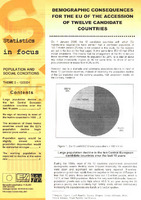Statistics in Focus: Population and social conditions. DEMOGRAPHIC CONSEQUENCES FOR THE EU OF THE ACCESSION OF TWELVE CANDIDATE COUNTRIES.
| dc.contributor.author | Eurostat |
| dc.date.accessioned | 2020-09-29T09:20:14Z |
| dc.date.available | 2020-09-29T09:20:14Z |
| dc.date.issued | 2001 |
| dc.identifier.uri | https://ketlib.lib.unipi.gr/xmlui/handle/ket/2891 |
| dc.description | Downloaded from EU Bookshop |
| dc.description | http://aei.pitt.edu/id/eprint/85241 |
| dc.description.abstract | On 1 January 2000, the 12 candidate countries with which EU membership negotiations have started* had a combined population of 105.7 million people (Turkey is not covered in this study, for the reasons set out in the box on the final page). At the same time, EU-15 had 376.4 million inhabitants. This means that the enlargement of the EU to include these countries would increase its population by 28%, to a total of about 482 million inhabitants (Figure 1). At the same time, its share of world population would increase from 6.2% to 8%. However, due to a dramatic and continuing population decline in most of these 12 candidate countries, instead of reversing the population decline of the EU expected over the coming decades, their accession would, on the contrary, hasten it. |
| dc.format.extent | 8p. |
| dc.language.iso | en |
| dc.publisher | Statistical Office of the European Communities and Social Statistics |
| dc.subject | Demographics Community |
| dc.subject | Social Policy |
| dc.title | Statistics in Focus: Population and social conditions. DEMOGRAPHIC CONSEQUENCES FOR THE EU OF THE ACCESSION OF TWELVE CANDIDATE COUNTRIES. |
| dc.type | working document |
| dc.publisher.place | Luxembourg |

